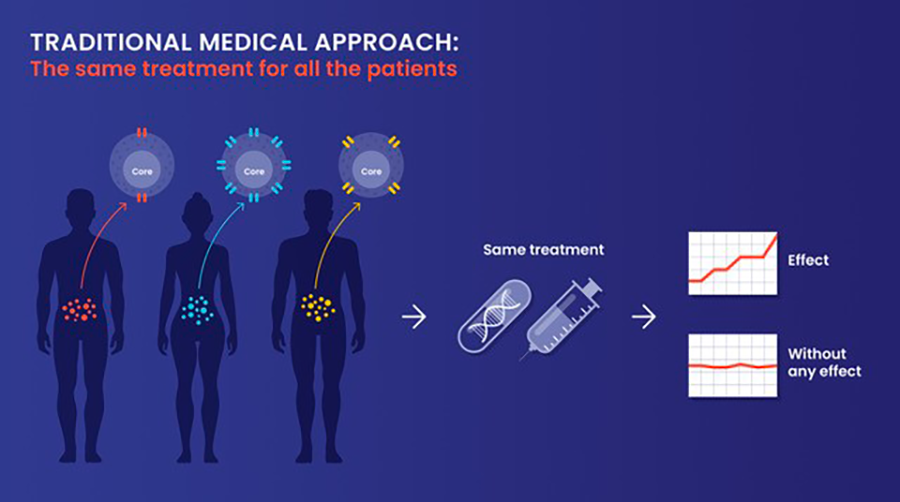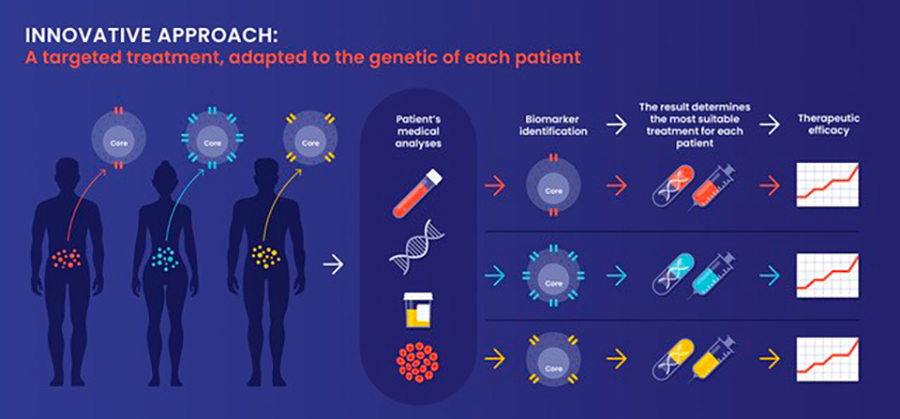Precision medicine is focused on providing treatments that are targeted and tailored to the biological make-up of each patient. What a revolution in healthcare! For many diseases —such as certain kinds of cancer or neurological disorders — it marks a real paradigm shift in terms of how they are managed. To take this approach further, however, the pharmaceutical industry and healthcare systems must overcome a number of scientific, technological, ethical, and regulatory challenges.
The biological uniqueness of each patient is central to their care
Conventional medicine is based on a so-called one-size-fits-all approach. In other words, patients diagnosed with the same condition receive the same treatment according to standardized protocols.

Source : European Federation of Pharmaceutical Industries and Associations – Precision Medecine1
Precision medicine takes the converse approach. Patients no longer receive treatment solely based on their illness, but rather according to their biological make-up and any molecular abnormalities associated with the disease. Consequently, patient care begins with the search for biomarkers, in other words, the identification of an objectively measurable biological characteristic. This research is essential for making a diagnosis and choosing the treatment that best suits the patient’s biological profile. When it comes to cancer, for example, a molecular portrait of a tumor can be made to determine whether the patient is eligible for precision treatment and, if so, which one. Patients diagnosed with the same cancer are therefore likely to receive different treatments, reflecting the many causes and forms of cancer.
In its early days, precision medicine was applied in oncology and neurology. Since then, its scope has expanded to include all therapeutic areas, including cardiometabolism and inflammatory diseases.

Source : European Federation of Pharmaceutical Industries and Associations – Precision Medecine1
Undeniable advantages
Precision medicine is profoundly transforming patient care:
Aside from the undeniable therapeutic advantages, precision medicine also has major socio-economic benefits. Because patients undergo targeted treatments, medical resources are allocated more efficiently, with fewer hospitalizations and reduced unnecessary medical procedures. As a result, healthcare infrastructures are less burdened.

Predictive medicine: The next revolution?
Precision medicine is based on patient-specific biomarker analysis. Currently, this testing is mainly used for patients who already show clinical signs of a disease. However, it can also be proposed to healthy individuals with a family history of an identified genetic disorder. Take the example of BRCA1 and BRCA2 gene mutations. Known to greatly increase the risk of breast and ovarian cancer, identifying them can lead to enhanced screening and monitoring with regular mammograms5. The development of predictive medicine brings with it very promising prospects, but it also raises a number of ethical and moral considerations. One of these is the need for stringent protection of patients’ personal data in order to prevent any discrimination against those with genetic predispositions, and another is safeguarding the right not to know.
A sophisticated therapeutic arsenal underpinned by targeted therapies
Precision medicine is based on the administration of targeted therapies, including:
Additionally, technological innovations relating to gene analysis, such as high-throughput sequencing, also play a crucial role in the development of precision medicine. This next-generation sequencing technique can simultaneously identify several genetic abnormalities. This results in more rapid identification of relevant treatment targets and faster administration of targeted therapy to patients.
Diagnostic testing, an essential link in advancing precision medicine
For precision medicine to deliver on its full potential, patients must have quick and easy access to the biomarker tests that are essential in determining their eligibility for targeted therapies. Greater access to these diagnostic tests is therefore a key factor in ensuring equal access to targeted treatments.
The pharmaceutical industry must adapt to new challenges
The development of precision treatments opens up tremendous opportunities. However, it will also require a profound transformation of the pharmaceutical industry, which must now provide concrete and tangible solutions to a number of challenges. In particular, the clinical and regulatory framework for precision medicine needs to be better defined by the competent regulatory authorities. More specifically, clinical trials need to be redesigned. Due to the fact that precision treatments target specific patient populations, recruiting patients for clinical trials is often a long and difficult process, slowing down the introduction of innovative therapies to the market.
“Servier has successfully transformed the entire organization to embrace precision medicine, going beyond the traditional scope of R&D. Developing targeted therapies, particularly for rare diseases, is now one of the Group’s top priorities. We have expanded our therapeutic expertise and capabilities through initiatives, including for example, the creation of our own antisense oligonucleotide (ASO) platform. We have also acquired companies such as Symphogen, which has become our center of excellence for therapeutic antibodies. Last but not least, we have forged strong partnerships with biotech gems including Owkin. We also place great importance on collaborating with other key players in the pharmaceutical industry, from academic organizations to clinical institutions.”
[1] European Federation of Pharmaceutical Industries and Associations – Precision Medicine – https://www.efpia.eu/about-medicines/development-of-medicines/precision-medicine/ – consulted on 11 March 24
[2] https://www.leem.org/100-questions/medecine-de-precision-en-quoi-accelere-t-elle-le-progres-therapeutique – consulted on 12 March 25
[3] ibid
[4] https://www.leem.org/100-questions/medecine-de-precision-en-quoi-accelere-t-elle-le-progres-therapeutique – consulted on 12 March 25
[5] Institut National du Cancer – Prédispositions génétiques (French National Cancer Institute – Genetic predisposition) – https://www.cancer.fr/personnes-malades/les-cancers/sein/comprendre-les-cancers-du-sein/developpement-des-cancers-du-sein/les-facteurs-de-risque/predispositions-genetiques#scrollspy-anchor1

